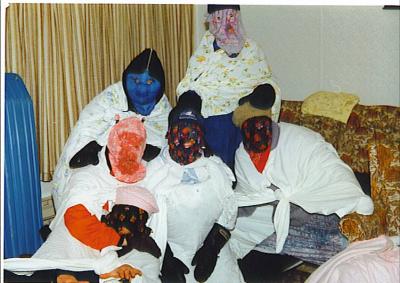Residents of small isolated fishing villages on the northern peninsula of Newfoundland have participated in the ritual of “mumming” for centuries. According to the tradition, small groups of villagers, or mummers, disguise their identities and go to other houses to threaten violence, whereupon the people of the houses try to guess the intruders’ identities.
A study by researchers at the University of Missouri-Columbia argues that this tradition is a manner of communicating trust and trustworthiness. The mummers who threaten violence must prove themselves trustworthy by not committing a real act of violence, and the hosts of the invaded home must demonstrate trust by not responding to threats with fear or violence, said Christina Nicole Pomianek, an MU doctoral student.
“In this ritual, participants are making themselves vulnerable at the hands of the other,” said Craig T. Palmer, assistant professor of anthropology in the College of Arts and Science. “It’s a way for community members to prove their trust and commitment to each other.”

Mumming traditionally took place in these villages during the 12 days after Christmas. A small group of mummers disguised themselves in costumes and went to a house at night. They rapped on the door with sticks and then entered, regardless of response from the hosts inside. Inside, they threatened the hosts with physical and sexual violence, while the hosts were expected to respond calmly and try to guess the identities of the mummers. If their identities were correctly identified within 10 to 15 minutes, the mummers removed their disguises and often sat down to a friendly drink with the hosts. If their identities were not guessed, the mummers left without disrobing.
The timing of this mumming ritual was just before the long winter months, during which villagers often had to rely on the generosity of neighbors to avoid starvation, Palmer said. He believes that this timing makes sense, since trust during the difficult winter would be particularly important to survival.
Today, mumming in Newfoundland continues only on a small scale, mostly as a tourist attraction. Palmer said that mumming severely declined in the late 1950s and ‘60s, when roads were built to connect the formerly isolated communities to the outside world in the winter. Members of the communities began to fear mumming because “in the back of their minds, they worried some outsider might have come on the road and couldn’t be trusted,” Palmer said.
Pomianek said that similar rituals are practiced today in many communities, including trust-building exercises such as the “trust fall.” She added that many in the corporate world have become interested in exercises that build trust. Palmer pointed to “friendly insults” exchanged between close friends as an everyday ritual of testing and proving trust.
“Trust is very important in all communities,” he said. “Most people don’t live in small-scale communities anymore, so we are often uncertain about whether or not we can trust the people with whom we interact. We’re constantly calculating how much we can trust other people.”
Atticle: “Applying Signaling Theory to Traditional Cultural Rituals: The Example of Newfoundland Mumming,” Human Nature, October 2007




Comments